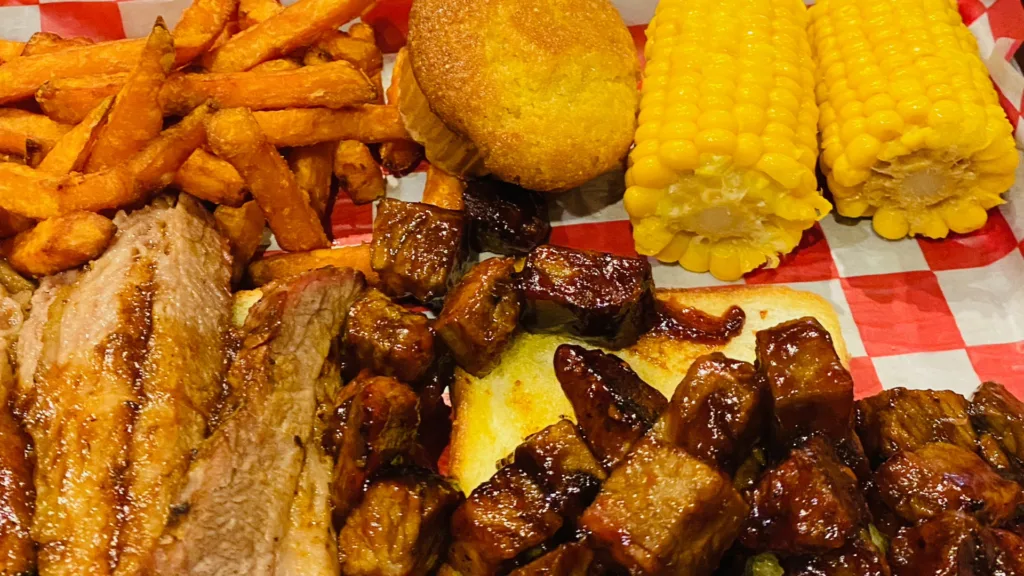If you have IBS, doesn’t matter which subtype you have, you have undoubtedly been thinking about the foods that you shouldn’t be eating. The ones that might cause or worsen your IBS symptoms.
Because food is the thing that you put into your stomach and intestines and for this reason it must be playing the most important role in how your symptoms happen.
Food does matter. But it’s not in the way that you would necessarily expect! (And it’s not the only thing that matters, but that’s a discussion for another blog post.)

If I asked anyone with IBS on the street what they shouldn’t eat, the answer most likely would have a lot to do with FODMAPs. They might mention onion, garlic or wheat, or some other food that is high in FODMAPs. FODMAPs are small prebiotic fibers that you can’t digest, but your gut microbes can. This microbial fermentation of FODMAPs in the large intestine is what leads to gut symptoms in people with IBS (and in people without IBS, although gut symptoms not as readily).
Unfortunately, the story about FODMAPs in IBS is a more complicated one than this. Yes, the low FODMAP diet has been researched and looks to improve IBS symptoms at least a little in up to 2/3 of patients with IBS. But FODMAPs do not cause IBS. On the contrary, they are beneficial for your digestive health as they are food for your friendly gut bacteria that keep you healthy.
If you eliminate all FODMAPs from your diet, you will change your gut microbiota balance for the worse. You should always include some FODMAPs in your diet. Read more about the low FODMAP diet here. Do not jump into the diet without talking to an expert first.
What you shouldn’t eat is not about FODMAPs
Here’s the big reveal: what I would say you shouldn’t eat if you have IBS is a Western diet. You know, the kind that consists of burgers, hot dogs, sweets, chips and sodas, and not much, if any, fruit, vegetables or whole grains.
I’m sure you have some idea about why a Western diet is not good for you or your gut, but there are many reasons why it’s especially bad if you have IBS.

Why the Western diet makes IBS worse
Four reasons why a Western-style eating pattern is detrimental for digestive health:
- Lack of essential nutrients. Your body, including your digestive system, needs certain nutrients every day to function well. All the bodily tissues and the metabolic reactions within each body cell requires energy, protein, essential fatty acids and vitamins and minerals to do their job. For example, zinc is needed in hundreds of ways in the body, and essential fatty acids become parts of the membranes that envelope each and every body cell. In the gut, some nutrients take care of the gut barrier, helping to make sure that harmful substances can’t cross into the blood stream to cause you problems.
- Lack of fiber. Fiber not only keeps your intestines working regularly, but it is also very important for your gut microbiota. The microbes in your gut can keep you healthy if you give them food every day. If not, they may begin to harm your health – such as your brain, your heart, your liver and of course, your digestion. Good gut bacteria make vitamins and many other types of molecules that help us, but they can’t do this if they don’t have food. Without fiber, microbial diversity suffers, and with this its function. Fiber is also needed to keep your gut barrier working as it should.
- Lack of antioxidants. Antioxidants, like polyphenols, protect your body from damage and can reduce inflammation. Polyphenols are also food for your good gut microbes.
- Too much fat, especially saturated fat. Fat in excess is difficult for your digestion. It can harm your intestines' topmost cell layer, which can cause things to pass into your bloodstream that shouldn't. This also can harm your gut microbiota. Even worse if you don't have a lot of fiber in your diet.
- Additives. Western-type diet is usually very high in packaged and processed foods, which means that very likely they also contain a lot of additives, like preservatives, emulsifiers, and other substances that prolong shelf life of the product and make the texture or taste more desirable. A lot of these additives can be harmful for your digestion.
These five points lead to three ways in which Western diet can harm your digestive system: inflammation, gut microbiota dysbiosis and increased intestinal permeability. Let’s now take look at them.

Inflammation and increased gut permeability
Inflammation: all these points above can cause inflammation in the intestines. On top of this, people eating lots of calorie-rich yet nutrient-poor foods tend to gain weight, which also has an inflammation promoting effect. While IBS is not caused by active inflammation in the intestines, a low level of inflammation can contribute to IBS. Inflammation is caused by your own immune system and is a necessary function of the body, but when inflammation sticks around longer, it can lead to hypersensitivity of the intestines and many other problems.
Microbial dysbiosis: your large intestine is a home of trillions of bacteria, viruses and yeasts. Many of them are beneficial to health by producing vitamins and substances that reduce inflammation, like short chain fatty acids. You also have illness-causing bacteria in your gut, which is not a problem as long as there is a good balance (eubiosis) of all the microbes in your gut. When the balance becomes broken (dysbiosis), harmful bacteria begin to thrive, which can lead to inflammation and increased gut permeability.
Increased permeability: your gut is very good at absorbing valuable nutrients through the gut wall into the blood stream and leaving out harmful substances and bacteria. When something, like a low quality diet, harms permeability, harmful substances have a better chance of getting through into the blood stream. Since now they can travel anywhere in the body, they can cause problems, like inflammation, anywhere in the body too.
These three gut harming factors are also mechanisms that are thought to cause IBS symptoms. This can lead to discomfort or pain, and slower or faster than desired intestinal motility, or in other words diarrhea or constipation. Your gut-brain axis is a major player in IBS and while it isn’t directly affected by food, it is certainly very much affected by your gut microbiota and inflammation. And as you now know, diet affects your gut microbes and inflammation a great deal.

What to do instead
Instead of the Western diet, I recommend eating a Mediterranean-type diet. Research repeatedly shows that the Mediterranean diet benefits us in pretty much every way, from living longer to weight loss and diabetes. It helps reduce inflammation and keeps both your gut microbes and gut barrier in good shape.
The Mediterranean diet is characterized by high intake of fruits, vegetables, legumes, nuts, olive oil, and fish, and low consumption of red meat, dairy products, and saturated fats. Use it as a template on which to build your own individualized gut-healthy IBS diet.
But what about FODMAPs? Why is this diet a thing in IBS if FODMAPs are good for you? The thing is, FODMAPs don't really cause IBS symptoms, even though it might seem like it. The real problem is that your gut is more sensitive to everything going on in there, and since FODMAPs tend to increase gas, a sensitive gut can feel this as discomfort when normally it wouldn’t necessarily be felt at all. So, it’s the hypersensitivity that is the problem, and that’s a more effective target for IBS than simply removing foods from your diet. This is where calming the gut-brain axis comes in.
Calming your gut-brain axis is my aim with each of my online programs, and when working with clients 1-on-1 – I’ve seen great results! I look at everything that is going in your life that could be messing with your gut-brain axis and IBS symptoms, including diet, stress and sleep. If you’d like to explore what working with me might look like, book a free 30-minute call with me today.
Thank you so much for reading! I hope this helps 🙂

Much love,
Anna-Kaisa
Registered Dietitian
IBS and gut-health expert
AKWise.co
PS. Are you struggling with bloating and not sure what is causing it? I have a brand new free Ebook in which I explore more than 10 gut illnesses that cause bloating and provide every day remedies that have the power to ease bloating no matter what is causing it. Want it? Go here.
References:
- García-Montero C, Fraile-Martínez O, Gómez-Lahoz AM, Pekarek L, Castellanos AJ, Noguerales-Fraguas F, Coca S, Guijarro LG, García-Honduvilla N, Asúnsolo A, Sanchez-Trujillo L, Lahera G, Bujan J, Monserrat J, Álvarez-Mon M, Álvarez-Mon MA, Ortega MA. Nutritional Components in Western Diet Versus Mediterranean Diet at the Gut Microbiota-Immune System Interplay. Implications for Health and Disease. Nutrients. 2021 Feb 22;13(2):699. doi: 10.3390/nu13020699. PMID: 33671569; PMCID: PMC7927055.
- Malesza IJ, Malesza M, Walkowiak J, Mussin N, Walkowiak D, Aringazina R, Bartkowiak-Wieczorek J, Mądry E. High-Fat, Western-Style Diet, Systemic Inflammation, and Gut Microbiota: A Narrative Review. Cells. 2021 Nov 14;10(11):3164. doi: 10.3390/cells10113164. PMID: 34831387; PMCID: PMC8619527.
- Barber TM, Kabisch S, Pfeiffer AFH, Weickert MO. The Effects of the Mediterranean Diet on Health and Gut Microbiota. Nutrients. 2023 Apr 29;15(9):2150. doi: 10.3390/nu15092150. PMID: 37432307; PMCID: PMC10180651.
- Beam A, Clinger E, Hao L. Effect of Diet and Dietary Components on the Composition of the Gut Microbiota. Nutrients. 2021 Aug 15;13(8):2795. doi: 10.3390/nu13082795. PMID: 34444955; PMCID: PMC8398149.
- Berding K, Vlckova K, Marx W, Schellekens H, Stanton C, Clarke G, Jacka F, Dinan TG, Cryan JF. Diet and the Microbiota-Gut-Brain Axis: Sowing the Seeds of Good Mental Health. Adv Nutr. 2021 Jul 30;12(4):1239-1285. doi: 10.1093/advances/nmaa181. PMID: 33693453; PMCID: PMC8321864.
If you are wondering the answer to this question, you are not alone. There are millions of people out there experiencing gut symptoms and wondering if they should be worried about them.
The most common IBS symptoms are:
- Abdominal pain
- Bloating and/or distention of the belly
- Constipation
- Diarrhea
The way IBS is diagnosed, in order for your symptoms to “qualify” as IBS, abdominal pain must be present. It can be crampy, aching, and even quite severe. Often it is triggered or made worse by food, bowel movements and stress.

This abdominal pain is also often associated with a change in stool frequency or consistency. It typically gets better after having a bowel movement, and it would actually be concerning if it didn’t. Since abdominal pain in IBS is considered visceral pain, you’ll often feel pain in the midline of the body.
Bloating is a feeling of tightness and fullness of the abdomen, and your belly feels like it is visibly bigger, even though it may or may not be so. Distention is the term for your belly protruding more than usual with measurable increase in the abdominal circumference. People feel like they have a balloon in their belly, or that they are pregnant when they are not pregnant. Bloating and distention can cause discomfort and it may feel embarrassing.
Constipation is an infrequent bowel movement pattern, in which you have a bowel movement less than three times a week. Though it seems to me you can feel constipated even if you move your bowels daily. Constipation usually goes hand in hand with small, hard, pebble-like stools and they are hard to pass. You might feel like your bowels are not emptying fully.
Diarrhea is the opposite of constipation. It refers to loose, watery stools, more than three times per day. Diarrhea could also cause urgency - you can’t wait a minute longer to go to the bathroom or else an accident might happen.

These symptoms can be very debilitating. They might also change from day to day, one day having constipation and the next diarrhea. People experiencing IBS symptoms may feel like they need to watch closely what they eat, not stray too far from the toilet, and avoid going out to see friends, travel or eat out.
If you’ve been experiencing IBS symptoms for longer than a few weeks, or less if the symptoms are very difficult, I encourage you to go get them checked out. Then, even if your symptoms didn’t fulfill the IBS diagnostic criteria, you’d find out whether there’s something more serious going on, or whether there’s nothing to worry about. Either way, it’s better to be in the know than to be guessing!
If you have been diagnosed with IBS, but are not sure whether this is the right diagnosis, I would again encourage you to speak with your doctor. Ask how they diagnosed the disorder and voice your concerns. The end result (should be) that your doctor will either order more tests, or explain to you more thoroughly their thinking process, so that you can rest assured the right call has been made and that you can begin to apply the right therapies.
If you end up being diagnosed with IBS, or even if you’re not, I have what you need to improve your symptoms. Sign up to my IBSwise program, or if you’d like a more individualized approach, book a free 30-minute chat to discuss your next move.
Whatever you do, don’t be left alone with your symptoms! There is so much you can do to ease them.
Love,
Anna-Kaisa

